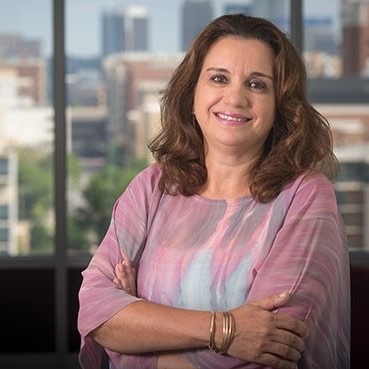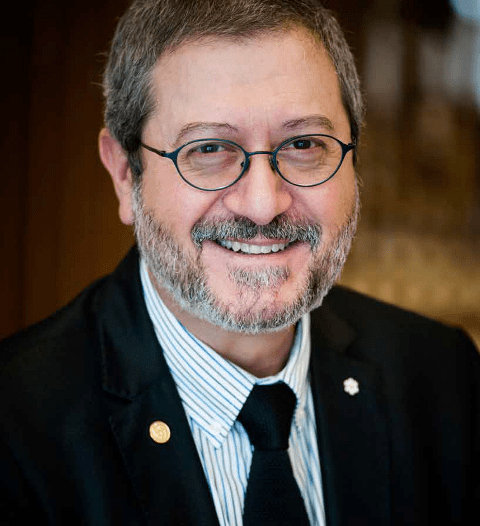Breaking Down the Silos: Enhancing your work through Cross-Disciplinary Collaboration
Wednesday, November 17, 2021
10:00-11:00 EST (GMT-4)
Leading papillomavirus researchers will share their experiences forming cross-disciplinary teams, how this has enhanced their research endeavors, and how they have overcome any obstacles related to cross-disciplinary collaboration.

Isabel C. Scarinci, Ph.D., M.P.H.
Professor, Vice-Chair for Global and Rural Health, Department of Obstetrics and Gynecology,
Senior Advisor for Globalization and Cancer, O’Neal Comprehensive Cancer Center
University of Alabama at Birmingham
I started my career in Brazil as a Clinical Psychologist, but I have always had a desire to do more than behavior change at the individual level. When coming to a different country (U.S.), some of us need to “start over”, thus, I obtained an MPH and MA/PhD in Clinical Psychology and made a commitment to work with underserved populations and change behavior at the population level. My work in cervical cancer began before we knew that HPV was its cause and focused on screening. Through multiple interdisciplinary collaborations, my work has evolved and now centers on development, implementation, and evaluation of evidence-based interventions that focus on primary (HPV vaccination) and secondary prevention (self-sampling for HPV testing) of cervical cancer in low-resource settings (including rural areas in the U.S. and low- and middle-income countries). After dedicating my career to research and education, I have become even more committed to scalability of these evidence-based approaches toward the elimination of cervical cancer as a public health problem in the world. Why do I believe we can do it? Because I had polio as a baby, and in 1963, the goal of eliminating this disease seemed to be unachievable. Today, in 2021 just as in 1963, we have the tools to fight another devastating but preventable disease, and it will be critical to leverage our collaborations at multiple levels.

Eduardo Franco, MPH, DrPH, PhD (Hon)
Professor, Chair of the Department of Oncology, and Director of the Division of Cancer Epidemiology,
McGill University, Montreal
Having begun my research on HPV in the mid-1980s, I am an ‘old-timer’ who has learned a few tricks over the years, some of which from lessons learned after a few embarrassing moments. To function effectively as an epidemiologist, I have had to establish multi-disciplinary collaborations with molecular biologists, virologists, clinicians, pathologists, behavioural scientists, statisticians, and nurses. In such inter-professional, and often international environments, I learned that it is essential that all collaborators develop a sense of intellectual ownership over the goals, design, methods, and conduct of a study. Making everyone feel important and playing an essential role in how the research is carried out is a formula for success and one that will help you build your cross-discipline reputation. In my short presentation during this workshop for Early Career Researchers, I will also talk about the importance of heeding the advice from peer review and developing respect for the culture and toolboxes of other disciplines.

Jennifer R. Grandis, M.D.
Distinguished Professor of Otolaryngology-Head and Neck Surgery
American Cancer Society Clinical Research Professor
University of California at San Francisco
I am a physician scientist whose research is focused on elucidating and targeting key signaling pathways and genomic alterations in head and neck cancer (HNC) with the goals of enabling precision medicine studies based on strong studies in relevant models. Via my appointment as a Professor of Otolaryngology-Head and Neck Surgery, I have leveraged my access to HNC patients and their biospecimens to optimize translational research studies that include developing novel therapies in the laboratory for clinical application as well as generating and interrogating relevant preclinical models to determine the underlying mechanism of clinical findings. In my institutional roles, I have facilitated collaborations between clinicians and investigators with an emphasis of developing a robust research infrastructure to support clinical and translational cancer studies. I served as PI of the NIH-funded Specialized Programs of Research Excellence (SPORE) in Head and Neck Cancer at the University of Pittsburgh from 2002-2014 and am Co-PI of that SPORE in a multi-PI structure through June 2021. I am a member of the Developmental Therapeutics Program at the Helen Diller Family Comprehensive Cancer Center at UCSF.
